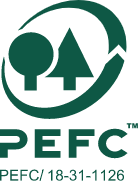Sustainable and harmless raw materials
to create something entirely new
Tannins: a gift from nature
Long ago, humans discovered that plant tannins could repel bacterial attack without discriminating between defending plant tissue or animal proteins. In an ironic human-directed twist of evolution, we repurposed a plant’s evolved defense against microbes to protect animal tissue against microbial attack.
Natural tannins are sourced from different plants, present either in bark, leaves, wood, fruits or roots. Ecotan products utilize 5 tannin sources: chestnut and quebracho wood, tara pods, gallnuts and olive tree pruning. Tannins are extracted simply in hot water and without the use of any chemicals. Spent materials from the production process rejoin nature as clean water or are upcycled into useful products like wood pellets.







